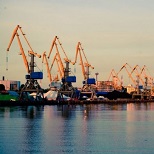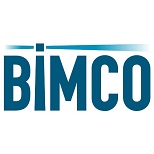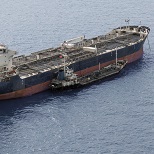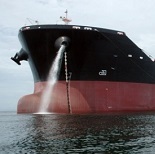And Ships of Every Flag Shall Come?
The existing practice of bringing shipowners and masters to financial and administrative liability for the discharge of segregated ballast in ports of Ukraine became a byword. Often sampling of ballast water on ships is made in violation of the rules. Believing that such a practice does not comply with international legal standards, shipowners are trying to recognize actions of inspectors of the State Environmental Inspectorate illegal in Ukrainian courts.
Till now, on the sites of P & I Clubs we could find cautions regarding the procedure for carrying out environmental monitoring of ballast water on ships calling at Ukrainian ports. For example, the site of one of the P & I correspondents provides the following information:
"To avoid penalties that arise due to the nature of the rules of de-ballasting, which are applied in Ukrainian ports, in most cases appears to be very difficult or almost impossible task." /
Further, it is stated that the money spent on these challenging fines often lead nowhere, except for additional delays and demurrage. The size of the fines can range from $ 5,000 to $ 60,000, as indicated by The London P & I Club.
On February 03, 2014, at the request of the Association of Stevedores of Ukraine, the State Service of Ukraine on Regulatory Policy and Entrepreneurship Development adopted Decision № 20 (hereinafter - the Decision) "On the need to eliminate violations of the principles of regulatory policy by the Ministry of Ecology and Natural Resources of Ukraine according to the Law of Ukraine "On the Principles of State Regulatory policy in Economic activity". The Decision recognized the Order of the Ministry of Environmental Protection and Nuclear Safety of Ukraine of 08.09.1999 №204 "On approval of the environmental control at checkpoints across the state border in the area of the regional customs and customs stations" (hereinafter - Regulations) illegal. As it is declared the Decision is designed to resolve the current unconformities in the area of environmental monitoring of ballast water discharge.
Obvious, there is a certain conflict of rules with regard to the grounds and procedures for environmental control of ballast water discharged from ships calling at the ports of Ukraine. The problem is as follows:
Paragraph 1.12 of Section 1 of the Regulations provides that the territorial bodies of the Ministry of Environmental Protection… carry out environmental monitoring at checkpoints across the state border in the area of the regional customs and custom stations, conduct express-analysis of substances and materials to determine their adherence to toxic and radioactive substances or waste and contaminated ballast content and wastewater of ships. According to paragraph 2.2 of section 2 of the Regulations such express-analysis is conducted by an Inspector while on duty (if necessary). Thus, the express-analysis of the content of contaminated ballast water and sewage is not obligatory.
On the other hand, this paragraph contradicts another clause (4.3.3) of the Regulations, which provides that while inspecting a ship an inspector independently or jointly with the authorized officer of the Main State Inspectorate for the safety of navigation or port state inspector conduct: survey of ship water conservation equipment for compliance with the established rules of protection of sea waters from pollution, external inspection of the vessel and the water surface beside him, checking for seals on drainage systems, ballast tanks, separation plants, systems, bilge water and other polluted waters drainage systems.
At the same time, it is stated that the officer in charge must check for availability and compliance of certain documents, in particular, ship environmental declaration. The Regulations also approved the form of the declaration, where, according to paragraph 4, for pumping of ballast it is necessary to obtain a permit from State Environmental Inspectorate of Ukraine.
The State Environmental Inspectorate of Ukraine allows pumping ballast solely on the results of the express-analysis of the content of the ballast on presence of contaminants, i.e., if the indicators of pollution do not exceed the standards for maximum allowable concentrations of pollutants in the internal sea waters and territorial sea. Those standards approved by the Resolution of the Cabinet of Ministers of Ukraine of 29.02.1996 № 269 "On approval of measures on the protection of inland waters and territorial sea from pollution and contamination.At the same time, the sampling procedure for segregated ballast during the environmental control is not legally provided. And in checkpoints only dirty ballast water and waste water may be exposed to express-analysis in case the fact of pollution of territorial and internal waters of Ukraine is fixed.
However, national legislation, in particular p.6.9 of the Order of the Ministry of Ecology and Natural Resources of Ukraine "On Approval of the Statutes of Marine Environmental Inspections" of 04.11.2011 № 429, establishes the right of the inspections to carry out environmental sampling and instrumental laboratory measurements of composition and emission properties of stationary and mobile sources of air pollution, soil, water (including segregated ballast).
It was repeatedly noted that the right of the environmental inspections is contrary to the provisions of the International Convention for the Prevention of Pollution from Ships, 1973, which entered into force for Ukraine on September 21, 1993 (MARPOL 73/78). The Convention divides ballast on clean, dirty and isolated (segregated). Segregated ballast is considered to be seawater accepted in isolated ballast tanks having autonomous pumping system and separate, just for these purposes pumps, which is dumped over board without restriction. So the requirement for environmental impact assessment of segregated ballast in Ukrainian ports has nothing to do with the applicable rules of international maritime law. It is obvious that clean sea water is used solely as a mass and is not involved in the processes associated with a change in its chemical composition. It is for these reasons that, according to the International Maritime Convention, segregated ballast is not subject to additional environmental control.
In this case, as provided for Part 2 of Article 19 of the Law of Ukraine "On International Treaties", the rules established by the international treaty should apply.
In addition, section 2.1 of the Convention on the Facilitation of International Maritime Traffic (FAL), determines that the state does not require retention, on arrival or departure of ships to which the Convention applies, any documents other than those specified in this section. “Ship environmental declaration” is not listed there.
In addition, up to date, none of legal acts of higher legal force in Ukraine contains this term.
Thus, the introduction of such document as “ship environmental declaration” and, as a consequence, responsibility for all ships to pass control of ballast water on the pollutant content was not in line with the international obligations assumed by Ukraine after the adoption of the Convention as well as with the applicable laws of Ukraine.
As per Ukrainian law the Decision should apply within two months. This should bring ballast water discharge procedures to international standards and make penalties as a result of corrupt practices of environmental authorities in ports of Ukraine intolerable.
We strongly believe that the changes will make easier and more efficient the cargo handling operations in ports, will significantly improve the competitiveness of the Ukrainian ports, and that the leading P&I Clubs will review their resent practices for refuse to insure the risks of shipowners for entry into the Ukrainian ports.
Published on forwarderlaw.com
(1).png)
Cargo transportation by sea is one of the most reliable and most expensive methods of goods delivery worldwide. Sea lines are one of...

A NEW INITIATIVE BY THE MINISTRY OF TRANSPORT AND INFRASTRUCTURE The new regulation that entered into force in 28 April 2021 has impo...

Dear colleagues, Here is Quarterly Shipping newsletter broght to you by Interlegal. Let us present the most valuable cases and n...

The issue of the port and berth safety is among those which raise various disputes between the interested parties. As the reasons for declar...

Although travel restrictions are beginning to ease, there are still restrictions in many countries impacting on crew changes. The new clause...
 Ship arrest in Ukraine: new approaches2020.06.18
Ship arrest in Ukraine: new approaches2020.06.18The concept of one shipowner – one vessel The concept of one shipowner – one vessel arose due to shipowners’ reasonable desire to secure...

Task The Client – large bunkering company making business in Black Sea Region – applied to Interlegal for debt recovery for bunker supply...

Dear Interlegal clients, Please be informed that in the third quarter of the 2019 year significant changes of Ukrainian legisla...

A presidential decree has been published in the official gazette on 03.05.2019 marking the date on which the 1999 Convention officially beca...
 LMAA arbitration notice clause2019.02.27
LMAA arbitration notice clause2019.02.27The LMAA has published a clause for use in arbitration agreements to facilitate effective notice by email (including for commencement of arb...




 Odessa, 65014, Ukraine, 1 а, Gretska St
Odessa, 65014, Ukraine, 1 а, Gretska St
